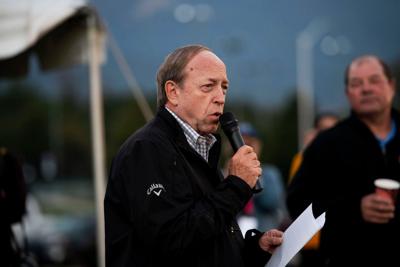Funding for roads, more support for police and fire, and fighting to ensure U.S. Space Command remains in Colorado Springs are among Mayor John Suthers' priorities for his last year in office.
Suthers is term-limited and would step down in April unless the already competitive mayor's race goes to a May runoff. The early contenders to fill the seat include Colorado Springs City Councilman Wayne Williams, El Paso County Commissioner Longinos Gonzalez, entrepreneur Yemi Mobolade, and former City Councilman and County Commissioner Darryl Glenn.
The victor would inherit leadership of a rapidly growing city facing numerous funding needs.
Suthers plans to prioritize some of those financial needs in his final months, he said in an interview with The Gazette. His No. 1 priority will be backing the extension of the portion of the Pikes Peak Rural Transportation Authority tax that funds big regional road projects, such as the needed expansion of Marksheffel Road.
Colorado Springs, El Paso County voters may decide on transportation tax extension in November
"It’s a mess," Suthers said of Marksheffel.
Voters are expected to weigh a 10-year extension of the regional roads tax in November on a ballot that will be dominated by federal midterm races. The portion of the 1% sales tax that funds big projects is scheduled to end in 2024, unless extended by voters. In 2022, the tax was budgeted to bring in a total of $147 million, with $81 million for large construction projects.
The funding is critical for upcoming major road extensions and expansions that cannot be covered by 2C funds, the dedicated city sales taxes for road paving and maintenance, because they are too expensive, he said. Just widening Marksheffel between Dublin Boulevard and north Carefree Circle will cost an estimated $60 million, city staff said previously.
Police, fire departments
The police and fire departments also have big financial needs for new buildings, and Suthers expects to work with the City Council on new fees to fund those projects.
"We need to do something dramatically different on police and fire impact fees," he said.
Instead of assessing police and fire impact fees on just newly annexed property, the fees would apply to new development already within city limits that is also burdening city departments. Suthers does not want to fund police and fire growth through an increase in the dedicated public safety sales tax, an increase that would hit retired residents.
GAO finds 'shortfalls' in Space Command relocation process
The new fees could help cover construction of two new police substations and five fire stations. The City Council may discuss the new fee structure in June, based on their agenda planning documents.
Keeping Space Command
Working to keep Space Command in Colorado Springs is another ongoing priority for the Suthers administration. Former President Donald Trump claimed responsibility for the decision made in January 2021 to move the military installation to Huntsville, Ala., The Gazette reported previously, but federal reviews of the decision are ongoing.
Suthers said the Government Accountability Office report that has not been released will help with the ongoing battle. A GAO review of the process that awarded U.S. Space Command to Alabama has identified “significant shortfalls” in the “transparency and credibility” that led to the decision, according to a senior-level source with knowledge of the report.
"There are no silver bullets in the Government Accountability Office report, but there is plenty of ammunition and that’s what we need," he said.
Moving the command and recreating the security infrastructure for the installation in Huntsville would be enormously expensive, and Suthers said he is optimistic city lobbyists can make a good case for keeping it in town.
Fire mitigation
As wildfire risks continue to worsen, the city will also be going after a portion of the many millions in federal and state grant funds for mitigation projects that are expected to flow. Those dollars can help with the city clear out overgrown forested areas on city property and reduce the overall fire risk.
The city's new $20 million wildfire mitigation fund, approved by voters in November, has set the city up well to apply for those dollars, he said.
"We have got automatic matching dollars. ... We can show how serious we are about it," he said.


(0) comments
Welcome to the discussion.
Log In
Post a comment as Guest
Keep it Clean. Please avoid obscene, vulgar, lewd, racist or sexually-oriented language.
PLEASE TURN OFF YOUR CAPS LOCK.
Don't Threaten. Threats of harming another person will not be tolerated.
Be Truthful. Don't knowingly lie about anyone or anything.
Be Nice. No racism, sexism or any sort of -ism that is degrading to another person.
Be Proactive. Use the 'Report' link on each comment to let us know of abusive posts.
Share with Us. We'd love to hear eyewitness accounts, the history behind an article.